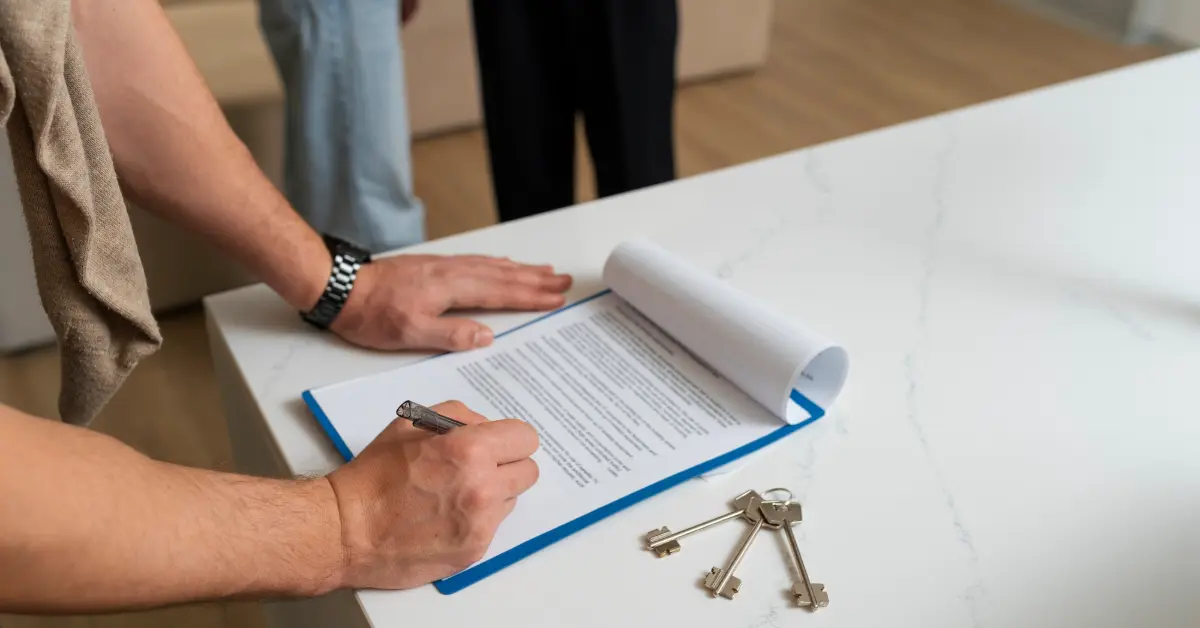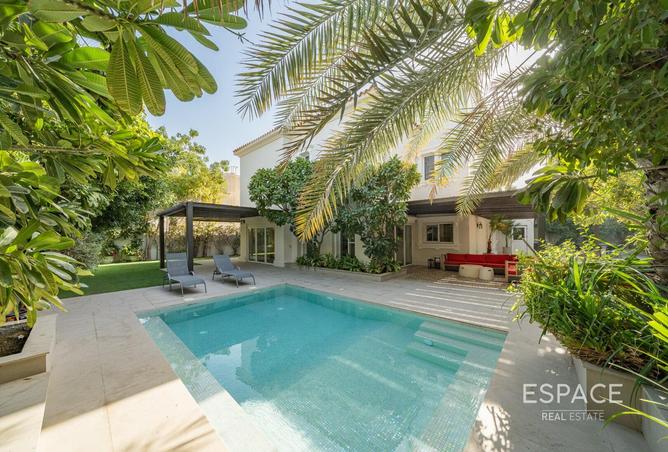An Electronic No Objection Certificate (eNOC) is a digital clearance issued by the Dubai Land Department (DLD), confirming that a property has no outstanding service charges, disputes, or legal holds that would prevent a sale, mortgage release, or ownership transfer. Similar to obtaining an NOC from the developer in Dubai during property transactions, the eNOC ensures that all obligations are settled before ownership changes hands. Because the process is entirely online and integrated with Mollak (DLD’s platform for jointly owned properties), approvals are faster, traceable, and consistent across Dubai’s freehold communities.
It’s a critical step before transferring ownership or completing any significant real estate transaction in Dubai.
Unlike the traditional paper-based NOCs once issued by developers, the eNOC system is entirely online. It ensures transparency, standardisation, and faster clearance for individual owners and investors.
The eNOC confirms that:
- All service charges and maintenance fees are paid.
- There are no disputes with the Owners’ Association (OA) or the developer.
- The property is free from restrictions that would block a transfer or mortgage.
It is mandatory for any property listed under DLD’s Mollak system, the digital platform that manages jointly owned properties, such as apartments, towers, and gated communities.
If you’re buying property in Dubai, understand eNOC requirements before transferring ownership.
- Eligibility Criteria
- Which Properties Require eNOC
- Why You Need an eNOC in Dubai
- Step-by-Step Guide: Applying via Dubai REST App
- Application Without the REST App
- Post-Submission Review & Approval
- Required Documents
- Processing Time & Fees
- Tips and Common Issues
- eNOC and Property Transfer: Buyer & Seller Roles
- How eNOC Differs from Develop NOC
- Key Takeaways
- FAQs
Eligibility Criteria

Before applying for an Electronic No Objection Certificate (eNOC), you must confirm that your property and applicant profile qualify.
The eNOC process primarily applies to ready properties under the Dubai Land Department’s Mollak system, which is the database governing jointly owned properties, such as apartment buildings and mixed-use developments.
You can request an eNOC if you’re:
- A property owner of a completed, registered unit.
- A developer or real estate company representing a project.
- An Owners’ Association (OA) management company responsible for service-charge collection.
- A registered investor holding a title deed or authorisation from the DLD.
Each party plays a role in ensuring compliance before a property changes hands.
Which Properties Require eNOC
The eNOC is mandatory for all units recorded in Mollak. This includes thousands of buildings across Dubai’s key freehold communities, such as:
- Downtown Dubai: luxury towers managed by owner associations.
- Dubai Marina: high-rise waterfront residences where OA dues must be cleared before resale.
- Jumeirah Village Circle (JVC): mid-market developments where most transfers go through the eNOC portal.
- Business Bay: mixed-use towers typically require clearance from both OA and the developer.
If your title deed or service-charge statement mentions Mollak Registration Number or Jointly Owned Property (JOP), the eNOC step is compulsory.
Why You Need an eNOC in Dubai
In Dubai’s real estate market, the eNOC serves as a legal checkpoint that protects both buyers and sellers from future disputes. It is not just a procedural formality; it ensures that all financial and legal obligations related to the property have been fulfilled before ownership officially changes hands. Without this clearance, DLD will not proceed with title transfer at the trustee’s office.
The eNOC system:
- Ensures buyers receive a clean, debt-free asset.
- Confirms sellers have settled service charges and OA dues.
- Maintains complete digital transparency through the DLD-Mollak system.
- Prevents fraudulent or premature property transfers.
It’s vital for mortgage release, inheritance transfer, or portfolio resale transactions that require multiple clearances.
For instance, a buyer purchasing an apartment in Arabian Ranches or Town Square Dubai can rest assured that all previous service charges are settled upon issuance of the eNOC.
Sellers working with SuperAgents often complete eNOC early to reassure buyers and accelerate transfers on verified listings. Learn how to verify your listing.
Obtaining the eNOC early helps:
- Speed up mortgage approval at banks.
- Avoid last-minute trustee-office cancellations.
- Simplify due diligence checks by agents and buyers.
It’s standard practice for sellers working with SuperAgents on Property Finder Verified Listings to complete their eNOC before marketing their property. Doing so reassures potential buyers that the listing is compliant and transfer-ready, a key factor for faster sales and higher buyer confidence.
Step-by-Step Guide: Applying via Dubai REST App

The Dubai REST App, developed by the Dubai Land Department (DLD), is the official platform for managing property records, verifying ownership, and submitting electronic service requests, including eNOC applications.
It’s available on iOS and Android and connects seamlessly with UAE PASS, allowing users to complete ownership transfers from anywhere in the world.
Before You Begin
Before starting your eNOC application, make sure:
- You’re registered on the Dubai REST App and can log in using your UAE PASS.
- Your Emirates ID, title deed, and contact number are up to date.
- Your property is listed under Mollak, confirming it’s a jointly-owned property requiring OA clearance.
- You’ve cleared all community service charges and received your latest statement from the Owners’ Association.
Application Steps
- Open the Dubai REST App and log in using UAE PASS or Emirates ID.
- Select your property under “My Properties.”
- Click the “More” menu and select “eNOC Request.”
- Review prerequisites and add or remove buyers as needed.
- Enter or verify the details for both the seller and the buyer.
- Upload the required documents (Emirates ID, title deed, etc.).
- Submit the request; you’ll receive a reference number to track your application.
Once submitted, the request is automatically routed to the property’s OA management and developer for digital review.
After Submission: Tracking and Updates
- Check your Dubai REST dashboard to view the live status of your request.
- You’ll receive SMS and email notifications once the OA or developer responds.
- If any document is missing, the system lets you resubmit it instantly.
- The eNOC will appear as a downloadable digital certificate via REST upon final approval.
Application Without the Dubai REST App
If you can’t access the Dubai REST App, you can still apply for an eNOC through your Owners’ Association (OA) management company or developer’s customer service portal. This pathway is beneficial for:
- Property owners residing abroad,
- Corporate entities managing multiple units, or
- Investors who have not yet activated the UAE PASS.
How It Works
- Contact your OA or developer through their official portal or customer care email.
- Provide your title deed, Emirates ID, and a completed eNOC request form.
- The management company will apply directly to DLD on your behalf.
- You’ll receive all notifications by email once the eNOC is approved or if any information is missing.
For example, if an OA company manages your apartment in Jumeirah Village Circle (JVC), they can complete the process via their authorised DLD channel.
Overseas Owners
Many expatriate investors rely on this option when managing their properties remotely. Suppose your unit is rented or managed via an agent on PropertyPro. In that case, your property manager can coordinate the eNOC on your behalf, ensuring a smooth transaction even if you’re outside the UAE.
Power of Attorney (POA)
If someone is applying on your behalf, ensure they hold a valid POA or a corporate authorisation letter that allows them to submit and sign real estate documents.
Post-Submission Review & Approval

Once your eNOC request is submitted through the Dubai REST App or your management company, it enters a structured digital review process. This stage ensures that all financial and ownership details are verified before the Dubai Land Department (DLD) issues its electronic clearance.
After you submit the request, it goes through two review stages:
- OA and Developer Review:
They verify that all service charges and maintenance fees are cleared and that no outstanding disputes exist. - DLD Verification:
The system ensures that the property’s financial and ownership data match DLD records.
Once approved, an eNOC is issued electronically. You’ll receive it via email and appear in your Dubai REST dashboard.
If rejected, you’ll receive the reason (for example, “unpaid fees” or “missing document”), which you can correct and resubmit.
Required Documents
Once your eNOC request is submitted through the Dubai REST App or your management company, it enters a structured digital review process. This stage ensures that all financial and ownership details are verified before the Dubai Land Department (DLD) issues its electronic clearance.
To ensure approval without delay, prepare the following:
- Emirates ID and a copy of the owner’s and buyer’s passports.
- Title deed (digital or hard copy).
- Service charge clearance letter from the Owners’ Association (OA) or developer.
- No-dues confirmation (if issued separately by OA).
- Buyer’s Emirates ID and contact details.
These documents ensure that ownership and community compliance records are consistent across Mollak and DLD’s registry.
Processing Time and Fees
Once your eNOC request is submitted and verified, the Dubai Land Department (DLD) and your Owners’ Association (OA) coordinate approval through the Mollak system. Timelines and costs can vary depending on your community, property type, and developer policies.
- Processing time: Typically 3–5 working days.
- Fees: The DLD does not set a fixed fee; costs vary depending on the developer or management company (average AED 200–500).
- Delivery: Approval is digital and sent via registered email, visible within your Dubai REST dashboard.
Fees and processing times may vary depending on the property’s community and management company.
Tips and Common Issues
Although applying for an eNOC in Dubai is a relatively straightforward digital process, a few common mistakes can lead to rejection or processing delays. Below are key tips to ensure a smooth experience from submission to approval.
- Always double-check buyer and seller details before submitting.
- Ensure service charges are cleared – this is the top reason for rejections.
- Use the reference number to track your case.
- If co-owned, all owners must be included in the application.
- After approval, inform your agent immediately to finalise the transfer at the trustee’s office.
When selling property through PropertyPro or via an agent, inform your agent once the eNOC is issued so the transaction can proceed smoothly.
Contact your OA management if you’re applying outside the REST platform.
eNOC and Property Transfers: Buyer & Seller Roles
During the transfer of ownership, both parties have key responsibilities:
- Seller: Must obtain and present a valid eNOC confirming no dues or violations.
- Buyer: You must review the eNOC and verify the details in the title deed before proceeding.
Transfers occur at authorised DLD trustee offices (e.g., Business Bay, JLT, and Deira). For practical area tips, see Property Finder’s community insights.
Explore the Available properties for Sale in Dubai
-

Villa
Listed 4 days ago
13,500,000 AED
Turnkey | Extended | Best Value Alvorada
Alvorada 1, Alvorada, Arabian Ranches, Dubai
4
4
8,451 sqft
-

Villa
Listed 3 weeks ago
13,500,000 AED
Extended | Upgraded | Private Pool
Alvorada 1, Alvorada, Arabian Ranches, Dubai
4
4
4,200 sqft
-

Apartment
Listed 5 days ago
1,950,000 AED
Exclusive | Fully Furnished | Prime Location JVC
Binghatti Emerald, District 15, Jumeirah Village Circle, Dubai
3
4
1,352 sqft
-

Villa
Listed 5 days ago
17,750,000 AED
Renovated | 4 Bedrooms | Skyline Views
Meadows 2, Meadows, Dubai
4
4
3,800 sqft
-

Villa
Listed 2 days ago
4,390,000 AED
Fully Upgraded | Vacant now | Converted 3 bed
Springs 4, The Springs, Dubai
3
3
1,647 sqft
-

Villa
Listed 1 week ago
14,500,000 AED
Single Row | New Six Bedrooms | Private
Aseel, Arabian Ranches, Dubai
6
4
4,622 sqft
-

Villa
Listed 2 weeks ago
6,895,000 AED
Fully Renovated | 4 Bedrooms | Vacant
Al Reem 2, Al Reem, Arabian Ranches, Dubai
4
4
2,487 sqft
-

Villa
Listed 1 week ago
29,900,000 AED
Corner | Handed Over | Genuine Seller
Address Hillcrest, Dubai Hills Estate, Dubai
5
7+
10,372 sqft
-

Villa
Listed 2 weeks ago
27,500,000 AED
Azure Blue | Biggest Layout | High Number
Frond M, Garden Homes, Palm Jebel Ali, Dubai
5
7+
8,434 sqft
-

Townhouse
Listed 3 days ago
5,250,000 AED
Single Row | 4BR + Maid | Motivated Seller
Gardenia Townhomes II, Wasl Gate, Dubai
4
5
3,097 sqft
How eNOC Differs from Developer NOC
Once your eNOC is approved, it becomes the foundation for completing a property transfer at a DLD Trustee Office. Both buyers and sellers have specific roles to ensure the transaction proceeds efficiently.
While both serve to clear a property for sale, they are not identical:
- Developer NOC: Used in new developments before the building is handed over to DLD.
- eNOC: Used post-handover, under DLD’s Mollak system, confirming OA compliance.
So, if you’re buying in a ready project like Dubai Hills Estate, you’ll typically deal with an eNOC. If you buy off-plan from a developer, you’ll obtain a developer-issued NOC before final registration.
Key Takeaways
The eNOC is a crucial digital clearance required for property ownership transfers in Dubai, particularly for properties under the DLD’s Mollak system. Applications are processed online through the Dubai REST app within 3–5 working days.
Ensure your title deed, Emirates ID, and ownership details are correct before submission. Fees differ depending on your OA or developer, and approvals are issued electronically via email.
This process is a key step for investors exploring the Dubai property market when buying or selling, whether through Property Finder’s Verified Listings or with SuperAgents, for smoother, compliant transactions.
FAQs
Property owners, developers, OAs, and investors for ready units registered under DLD’s Mollak system.
Usually 3–5 working days.
No, approvals are electronic and sent by email.
Yes, your management company can apply on your behalf.
Correct the stated issues, re-upload the required documents, and resubmit using the same reference.







